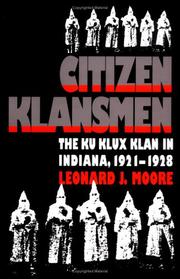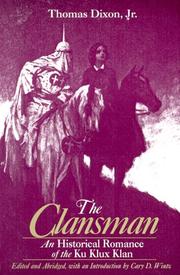| Listing 1 - 10 of 32 | << page >> |
Sort by
|
Book
ISBN: 0817385754 9780817385750 Year: 2010 Publisher: Tuscaloosa University of Alabama Press
Abstract | Keywords | Export | Availability | Bookmark
 Loading...
Loading...Choose an application
- Reference Manager
- EndNote
- RefWorks (Direct export to RefWorks)
The author, who writes of his experiences as an undercover agent in the KKK after WWII, has added an afterword and new photos to this edition.
Book
Year: 2017 Publisher: [Place of publication not identified] : Great Neck Publishing,
Abstract | Keywords | Export | Availability | Bookmark
 Loading...
Loading...Choose an application
- Reference Manager
- EndNote
- RefWorks (Direct export to RefWorks)

ISBN: 0807863491 9780807863497 0807819816 9780807819814 9798890868572 Year: 1991 Publisher: Chapel Hill University of North Carolina Press
Abstract | Keywords | Export | Availability | Bookmark
 Loading...
Loading...Choose an application
- Reference Manager
- EndNote
- RefWorks (Direct export to RefWorks)
Sociology & Social History --- Social Sciences --- Societies & Clubs --- Ku Klux Klan (1915- ) --- Ku Klux Klan (19th century) --- Knights of the Ku Klux Klan (1915- ) --- K.K.K. (Ku Klux Klan (1915- )) --- KKK (Ku Klux Klan (1915- )) --- K.K.K.K. (Knights of the Ku Klux Klan (1915- )) --- KKKK (Knights of the Ku Klux Klan (1915- )) --- National Knights of the Ku Klux Klan Association of America --- National Knights of the K.K.K. --- Invisible Empire --- History. --- Ku Klux Klan --- Indiana --- History
Book
ISBN: 146962544X 9781469625447 9781469625430 1469625431 9781469625423 1469625423 9798890849618 9781469652139 1469652137 Year: 2015 Publisher: Chapel Hill
Abstract | Keywords | Export | Availability | Bookmark
 Loading...
Loading...Choose an application
- Reference Manager
- EndNote
- RefWorks (Direct export to RefWorks)
"The first comprehensive examination of the nineteenth-century Ku-Klux Klan since the 1970s, Ku-Klux pinpoints the group's rise with startling acuity. Historians have traced the origins of the Klan to Pulaski, Tennessee, in 1866, but the details behind the group's emergence have long remained shadowy. By parsing the earliest descriptions of the Klan, Elaine Frantz Parsons reveals that it was only as reports of the Tennessee Klan's mysterious and menacing activities began circulating in northern newspapers that whites enthusiastically formed their own Klan groups throughout the South. The spread of the Klan was thus intimately connected with the politics and mass media of the North"
Racism --- Domestic terrorism --- Terrorism --- History --- Ku Klux Klan (19th century) --- K.K.K. (Ku Klux Klan (19th century)) --- KKK (Ku Klux Klan (19th century)) --- Ku-Kluks-Klan (19th century) --- Ku Klux Klan (19th cent.) --- Ku Klux Klan (1915- ) --- United States --- Race relations. --- Race question --- Ku Klux Klan --- 19th century --- Race relations --- Domestic terrorism. --- Racism. --- Rassismus --- Ku-Klux-Klan --- Ku-klux-klan (Etats-Unis) --- 1800 - 1899 --- 1800-1899 --- United States. --- USA --- Etats-Unis.
Book
ISBN: 0813161975 9780813161976 081315104X 9780813151045 0813183332 Year: 2015 Publisher: Lexington The University Press of Kentucky
Abstract | Keywords | Export | Availability | Bookmark
 Loading...
Loading...Choose an application
- Reference Manager
- EndNote
- RefWorks (Direct export to RefWorks)
This is a study of a disturbing phenomenon in American society -- the Ku Klux Klan -- and that eruption of nativism, racism and moral authoritarianism during the 1920's in the four states of the Southwest -- Texas, Louisiana, Oklahoma, and Arkansas -- in which the Klan became especially powerful. The hooded order is viewed here as a move by frustrated Americans, through anonymous acts of terror and violence, and later through politics), to halt a changing social order and restore familiar orthodox traditions of morality. Entering the Southwest during the post-World War I period of discontent
Ku Klux Klan (1915- ) --- Ku Klux Klan (19th century) --- Knights of the Ku Klux Klan (1915- ) --- K.K.K. (Ku Klux Klan (1915- )) --- KKK (Ku Klux Klan (1915- )) --- K.K.K.K. (Knights of the Ku Klux Klan (1915- )) --- KKKK (Knights of the Ku Klux Klan (1915- )) --- National Knights of the Ku Klux Klan Association of America --- National Knights of the K.K.K. --- Invisible Empire

ISBN: 076560616X 0765606178 1317457889 1315700115 1317457870 9781317457886 9781317457879 9781315700113 9781317457862 1317457862 9780765606167 9780765606174 9780765606167 Year: 2015 Publisher: London
Abstract | Keywords | Export | Availability | Bookmark
 Loading...
Loading...Choose an application
- Reference Manager
- EndNote
- RefWorks (Direct export to RefWorks)
Thomas Dixon was a lawyer, North Carolina state legislator, Baptist minister, lecturer, and novelist. This novel, an abridgement by Cary Wintz was originally published in 1905. It reflects turn-of-the-century attitudes most southerners had about Republican rule during Reconstruction.
White supremacy movements --- Reconstruction (U.S. history, 1865-1877) --- Racism --- Ku Klux Klan (19th century) --- South Carolina --- K.K.K. (Ku Klux Klan (19th century)) --- KKK (Ku Klux Klan (19th century)) --- Ku-Kluks-Klan (19th century) --- Ku Klux Klan (19th cent.) --- Ku Klux Klan (1915- )
Book
ISBN: 1613763794 9781613763797 9781625341884 9781625341891 1625341881 162534189X Year: 2015 Publisher: Amherst : Baltimore, Md. : University of Massachusetts Press, Project MUSE,
Abstract | Keywords | Export | Availability | Bookmark
 Loading...
Loading...Choose an application
- Reference Manager
- EndNote
- RefWorks (Direct export to RefWorks)
Borderlands --- French-Canadians --- Anti-Catholicism --- Border-lands --- Border regions --- Frontiers --- Boundaries --- Canadians, Francophone --- Canadians, French-speaking --- Francophone Canadians --- French-speaking Canadians --- Canadians --- Antipapism --- Prejudices --- History --- Ku Klux Klan (1915- ) --- Ku Klux Klan (19th century) --- Knights of the Ku Klux Klan (1915- ) --- K.K.K. (Ku Klux Klan (1915- )) --- KKK (Ku Klux Klan (1915- )) --- K.K.K.K. (Knights of the Ku Klux Klan (1915- )) --- KKKK (Knights of the Ku Klux Klan (1915- )) --- National Knights of the Ku Klux Klan Association of America --- National Knights of the K.K.K. --- Invisible Empire
Book
ISBN: 1628950706 1609171357 9781609171353 9781628960709 1628960701 9780870139956 0870139959 Year: 2011 Publisher: East Lansing Michigan State University Press
Abstract | Keywords | Export | Availability | Bookmark
 Loading...
Loading...Choose an application
- Reference Manager
- EndNote
- RefWorks (Direct export to RefWorks)
In 1920s Middle America, the Ku Klux Klan gained popularity not by appealing to the fanatical fringes of society, but by attracting the interest of average citizens. During this period, the Klan recruited members through the same unexceptional channels as any other organization or club, becoming for many a respectable public presence, a vehicle for civic activism, or the source of varied social interaction. Its diverse membership included men and women of all ages, occupations, and socio-economic standings. Although surviving membership records of this clandestine organization have proved incredibly rare, Everyday Klansfolk uses newly available documents to reconstruct the life and social context of a single grassroots unit in Newaygo County, Michigan. A fascinating glimpse behind the mask of America's most notorious secret order, this absorbing study sheds light on KKK activity and membership in Newaygo County, and in Michigan at large, during the brief and remarkable peak years of its mass popular appeal.
Social conflict --- Protestants --- Middle class --- Christians --- Class conflict --- Class struggle --- Conflict, Social --- Social tensions --- Interpersonal conflict --- Social psychology --- Sociology --- Bourgeoisie --- Commons (Social order) --- Middle classes --- Social classes --- History. --- Social conditions --- Ku Klux Klan (1915- ) --- Ku Klux Klan (19th century) --- Knights of the Ku Klux Klan (1915- ) --- K.K.K. (Ku Klux Klan (1915- )) --- KKK (Ku Klux Klan (1915- )) --- K.K.K.K. (Knights of the Ku Klux Klan (1915- )) --- KKKK (Knights of the Ku Klux Klan (1915- )) --- National Knights of the Ku Klux Klan Association of America --- National Knights of the K.K.K. --- Invisible Empire --- United States --- Conflits sociaux --- History --- Histoire --- Etats-Unis --- Conditions sociales
Book
ISBN: 0268104352 9780268104351 9780268104368 0268104360 9780268104344 0268104344 9780268104344 Year: 2018 Publisher: Notre Dame
Abstract | Keywords | Export | Availability | Bookmark
 Loading...
Loading...Choose an application
- Reference Manager
- EndNote
- RefWorks (Direct export to RefWorks)
Anti-Catholicism --- Antipapism --- Prejudices --- History --- University of Notre Dame --- Ku Klux Klan (1915- ) --- Ku Klux Klan (19th century) --- Knights of the Ku Klux Klan (1915- ) --- K.K.K. (Ku Klux Klan (1915- )) --- KKK (Ku Klux Klan (1915- )) --- K.K.K.K. (Knights of the Ku Klux Klan (1915- )) --- KKKK (Knights of the Ku Klux Klan (1915- )) --- National Knights of the Ku Klux Klan Association of America --- National Knights of the K.K.K. --- Invisible Empire --- Notre Dame, Ind. University --- South Bend (Ind.). University of Notre Dame --- South Bend (Ind.). Notre Dame University --- Notre Dame University --- Notre Dame (Ind.). University of Notre Dame --- University of Notre Dame du Lac --- Notr-Damskiĭ universitet --- History.
Book
ISBN: 0774824913 0774824905 0774824891 Year: 2013 Publisher: Vancouver : ©2013 UBC Press,
Abstract | Keywords | Export | Availability | Bookmark
 Loading...
Loading...Choose an application
- Reference Manager
- EndNote
- RefWorks (Direct export to RefWorks)
This provocative book provides a new interpretation of the Ku Klux Klan in 1920s Saskatchewan, arguing that it should not be portrayed merely as an irrational outburst of intolerance but as a slightly more extreme version of mainstream opinion that wanted to keep Canada British.
Racism --- History --- Ku Klux Klan (1915-) --- Saskatchewan --- Race relations --- Bias, Racial --- Race bias --- Race prejudice --- Racial bias --- Prejudices --- Anti-racism --- Critical race theory --- Knights of the Ku Klux Klan (1915- ) --- K.K.K. (Ku Klux Klan (1915- )) --- KKK (Ku Klux Klan (1915- )) --- K.K.K.K. (Knights of the Ku Klux Klan (1915- )) --- KKKK (Knights of the Ku Klux Klan (1915- )) --- National Knights of the Ku Klux Klan Association of America --- National Knights of the K.K.K. --- Invisible Empire --- Ku Klux Klan (19th century) --- Saskachevan --- Saskatchewan Government --- Government of Saskatchewan --- SK --- Sask. --- Social conditions
| Listing 1 - 10 of 32 | << page >> |
Sort by
|

 Search
Search Feedback
Feedback About UniCat
About UniCat  Help
Help News
News